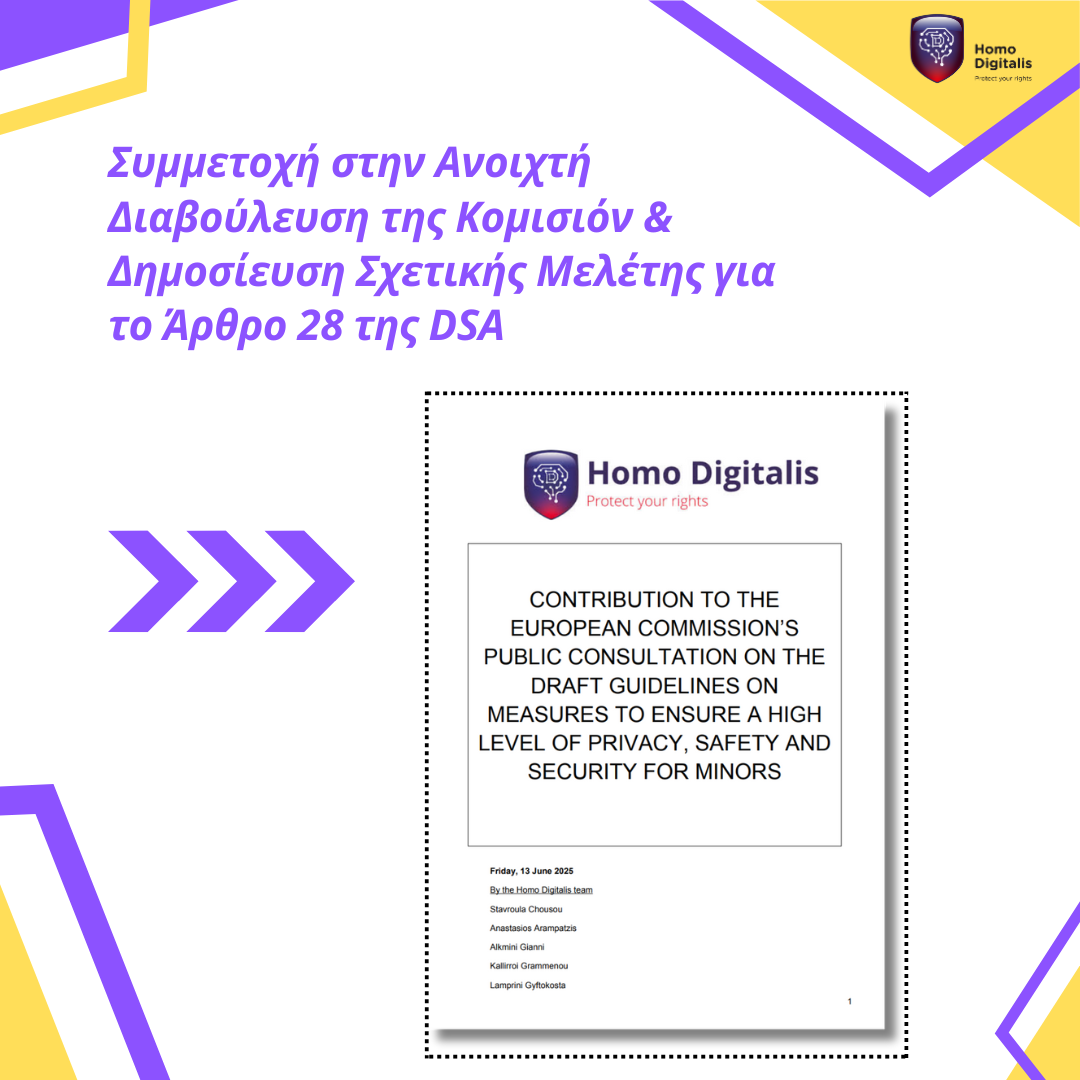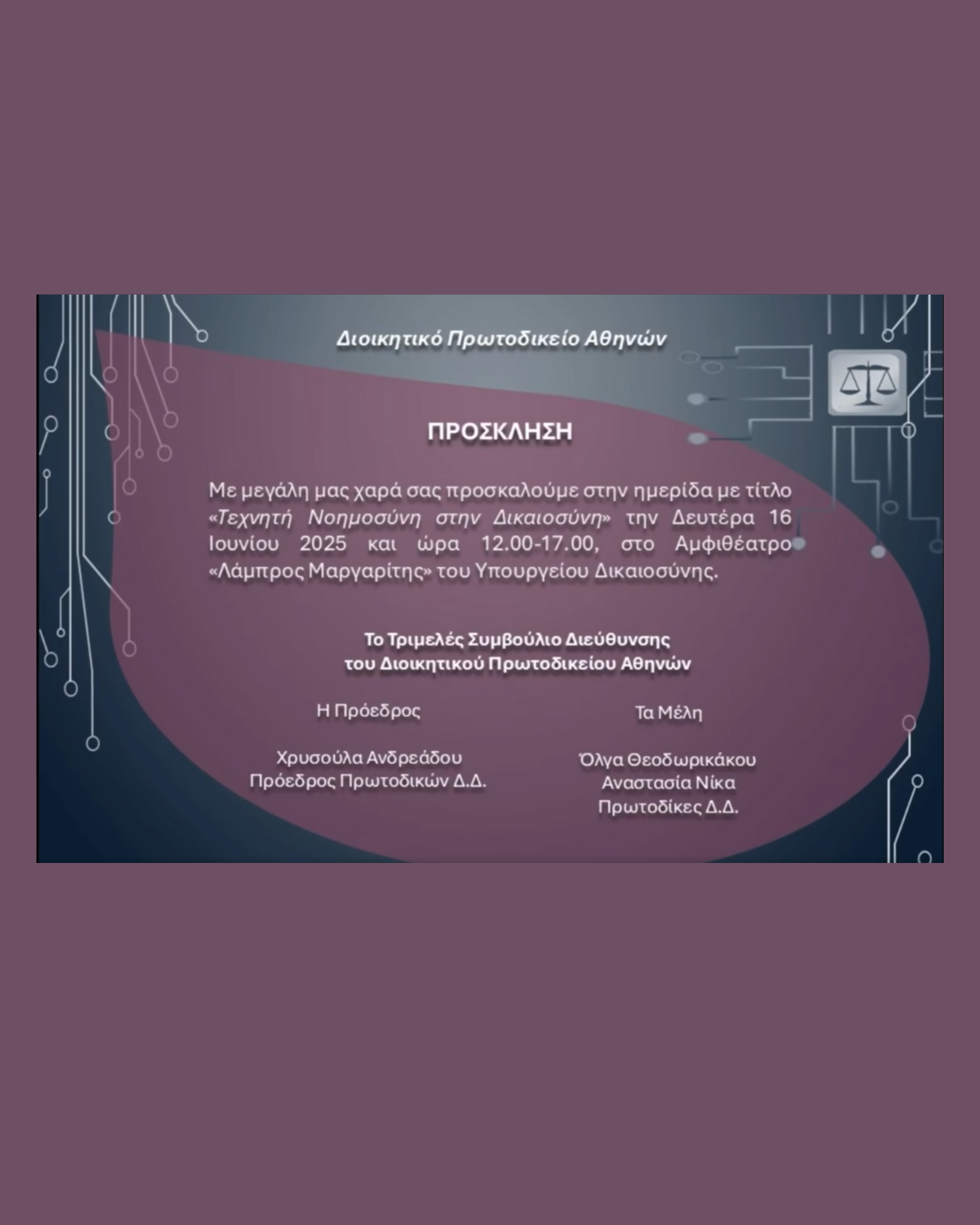Schools in Messinia at the Heart of Digital Awareness
From March 31 to May 7, the NGO Homo Digitalis visited 11 primary and secondary schools across Messinia, bringing education and awareness on internet safety closer to students.
During the workshops held in Arfara, Dorio, Eva, Thouria, Kalamata, Kyparissia, Pylos, Filiatra, Finikounda, and Chora, a total of 554 students engaged with key issues of the digital world, such as: cyberbullying, online safety, recognition and understanding of deepfakes, and responsible use of social media.
Raising awareness and informing both children and adults is a vital step toward a safe and healthy experience in the digital space.
The initiative was supported by the “Captain Vassilis and Carmen Constantakopoulos” Foundation and it will continue with new sessions from September to December 2025.
If your school is located in Messinia and would like to host these free educational sessions, please contact the Homo Digitalis team at info@homodigitalis.gr.
Homo Digitalis meets with the Greek Ombudsman
he Greek Ombudsman welcomed the non-profit organization Homo Digitalis to his offices on June 26, 2025, for a meeting on issues related to digital rights and artificial intelligence. Among other topics, the discussion addressed the role of the Ombudsman under the European Union’s Artificial Intelligence Act, following his designation as one of the fundamental rights authorities under Article 77 of the Regulation.
We warmly thank the Honorable Greek Ombudsman, Mr. Andreas Pottakis, for his time and availability.
Participating in the meeting was Homo Digitalis Co-founder and Executive Director Eleftherios Chelioudakis.
We sent an open letter to the EU calling for a reassessment of Israel’s adequacy decision under the GDPR
Together with European Digital Rights, Access Now, and 16 other civil society organizations, we submitted a second open letter to the European Commission, urging it to urgently reassess Israel’s adequacy status under the GDPR.
Since the Commission reconfirmed Israel’s status in January 2024, the situation has only deteriorated:
Escalating human rights violations in Gaza and the West Bank
Expansion of surveillance systems and biometric repression
Legal reforms undermining oversight of personal data processing
Ongoing data flows to Israeli companies with ties to security services
Use of AI-driven targeting systems in a context where the International Court of Justice has found plausible genocide
Application of Israeli law to occupied territories, in breach of the EU’s own policy
This is not just about technical compliance. It is about whether the EU’s data protection framework can credibly uphold fundamental rights, and whether data originating in the EU is being used to facilitate unlawful practices.
Read the letter here.
We announce the creation of the Pega-Coalition!
Together with the organizations Data Rights, Irídia – Centre per la Defensa dels Drets Humans, Társaság a Szabadságjogokért – Hungarian Civil Liberties Union, Gesellschaft für Freiheitsrechte e.V., Fundacja Panoptykon and Share Foundation, we announced today in Brussels the network “Pega-Coalition.”
The network aims to coordinate legal actions as well as advocacy efforts against spyware, both at the European level and nationally, in the countries where our organizations operate, namely Germany, Greece, Hungary, Poland, Serbia, and Spain.
We have already collaborated with these organizations on related legal actions, such as the successful filing of an amicus curiae intervention in the case of Brejza and Others v. Poland (applications nos. 27830/23) before the European Court of Human Rights in February 2025.
We recall that the Greek Government, under Articles 13 & 47 of Law 5002/2022, has been preparing for over a year now a draft Presidential Decree concerning the conclusion of contracts by state bodies for the procurement of surveillance software or devices. On 19/6/2025 we were informed by the Hellenic Data Protection Authority (HDPA), in response to our inquiry, that it has received the said draft decree and requested further clarifications, which it is still awaiting.
You can read more about the “Pega-Coalition” network here.
We submitted our views to the European Commission’s public consultation on Article 28 of the DSA
On June 13, Homo Digitalis submitted its responses to the European Commission’s Public Consultation regarding the guidelines for the protection of minors online, within the framework of Article 28 of the Digital Services Act.
The responses to the questionnaire were accompanied by a study, which provided a more detailed explanation of the relevant proposals and concerns.
The editorial team for this action consisted of Stavrina Chousou, Anastasios Arampatzis, Alkmιnι Gianni, Kalliroi Grammenou, and Lamprini Gyftokosta.
You can read the responses to the questionnaire here.
You can read the study here.
Homo Digitalis at the 2nd International Conference of ΑΤΙ dedicated to Democracy and Social Justice
Homo Digitalis will participate in the 2nd International Conference on Democracy and Social Justice, taking place on June 10 at 15:00 at the Nikos Skalkotas Hall of the Athens Concert Hall, organized by the Alexis Tsipras Institute!
Our organization will be represented by Konstantinos Kakavoulis, Co-Founder of Homo Digitalis & Lawyer, who will deliver a speech in Thematic Session II: “Democracy and Digital Transformation.”
Also speaking in the same session:
Evagelia Emily T., Assistant Professor and Researcher at the McCourt School of Public Policy, Georgetown University
Elisavet Linos, Associate Professor of Public Policy and Management, Harvard Kennedy School of Government
Kostas Gavroglou, former Minister of Education, Research and Religious Affairs (2016–2019)
Christos Porios, Founder of Schema Labs & Open Council
You can find more information about the conference, registration, and the full program – which features internationally renowned and highly respected speakers – here.
Homo Digitalis successfully delivered its talk at CPDP2025
Two weeks ago Homo Digitalis participated again at Computers, Privacy and Data Protection Conference, speaking at the Panel “Protecting the Digital Rights of Asylum Seekers and Refugees”, organised by the Centre for Fundamental Rights – Hertie School!
Eleftherios Chelioudakis, from our team joined Francesca Palmiotto (IE University) , Derya Ozkul (University of Warwick) and Joanna Parkin (EDPS – European Data Protection Supervisor) on Friday 23.05, at the closing panel of the conference in Grande Halle!
You can read the full recap of our panel discussion here.
Congratulations to the team of organizers from Hertie School, Ida Reihani, for their great efforts and cooperation!








